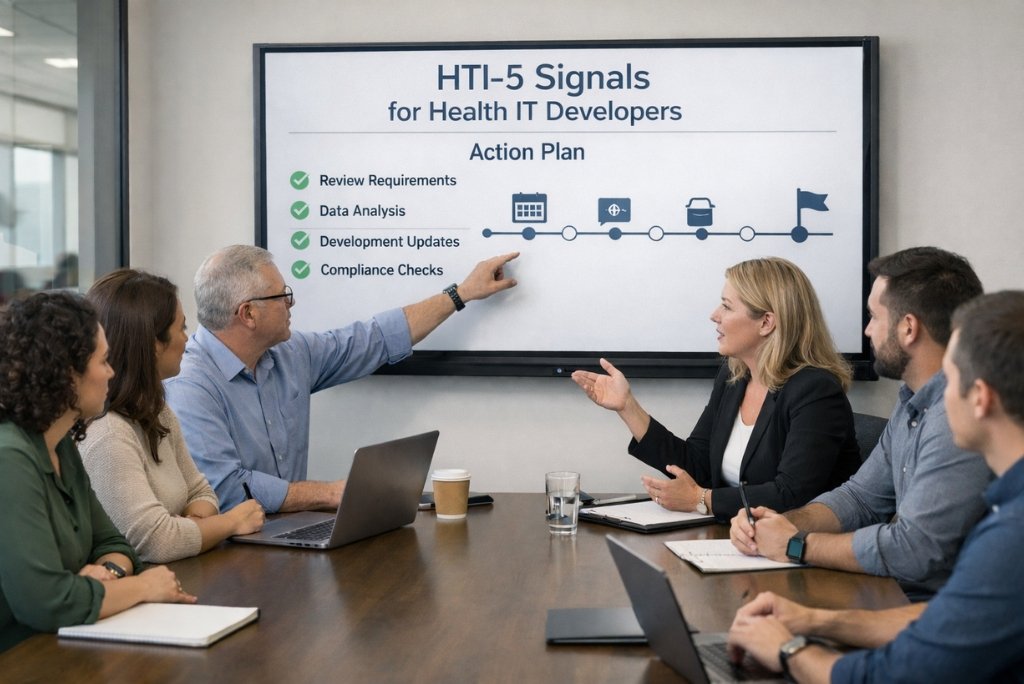Information Blocking Risks Grow After Federal Court Decision
Court Decision Puts Spotlight on Information Blocking
A new lawsuit is forcing the health IT industry to confront a hard truth: the courts are no longer giving vendors a pass on restrictive data practices.
In IntusCare, Inc. v. RTZ Associates, Inc. (now Collabrios Health), a federal judge refused to dismiss claims that restrictive data-sharing tactics may constitute information blocking under the 21st Century Cures Act. While this wasn’t a final ruling, the decision signals a growing willingness by courts to scrutinize how vendors control access to health data.
Read the docket here: Order – #89 in Intus Care, Inc. v. RTZ Associates, Inc. (N.D. Cal., 4:24-cv-01132) – CourtListener.com
What the Judge Decided
Judge Jon Tigar denied IntusCare’s motion for summary judgment. That keeps the case alive and moving toward trial, but it also spotlighted practices that could land other vendors in legal trouble:
Restrictive contracts are red flags. Requiring an NDA as a precondition for data access was highlighted as a potential form of information blocking.
Manual workarounds aren’t enough. Forcing customers to generate and send manual reports rather than providing direct electronic access was flagged as a burden that fits within the definition of information blocking.
The definition of “Actor” is broad. The court treated RTZ as an “Actor” under the Cures Act, even though it doesn’t sell a certified EHR or fit the classic profile of a Health Information Network.
Why This Ruling Matters
The court’s position should be a wake-up call across the healthcare IT domain:
Exceptions aren’t guaranteed shields. Vendors must prove fact by fact that “Manner,” “Security,” or “Infeasibility” exceptions apply.
Enforcement is not limited to EHRs. Any organization that controls data access could face information blocking claims.
Private enforcement is rising. Since the Cures Act does not provide a private right of action, plaintiffs are leveraging state Unfair Competition Laws (UCLs) instead.
A Larger Pattern
This isn’t an isolated case. Other lawsuits are pushing the same boundaries and are appearing across the country:
RTMS v. PointClickCare upheld continued access to health data.
CureIS v. Epic is testing similar unfair competition claims.
Together, these cases are defining how far courts will go when regulators can’t act quickly. The pressure is clearly building for vendors to open APIs, enable third-party apps, and remove artificial barriers.
What Comes Next
The court’s denial of summary judgment means the IntusCare trial will proceed. Redacted documents are expected soon, shedding more light on which facts and exceptions Judge Tigar sees as most contested. Notably, he also kept the case on a faster track by refusing to extend deadlines, suggesting that this dispute could reach a resolution sooner than expected.
Reassurance for Our Customers
Darena Health customers can take confidence in knowing our platform already meets Cures Act information-sharing requirements. Our certified modules, FHIR APIs, and SMART on FHIR infrastructure are designed to eliminate the exact risks now being litigated. Our platform is built to ensure that providers, EHRs, and third-party partners can exchange data seamlessly without falling into the traps of contractual restrictions, manual bottlenecks, or blocked access that are drawing legal action elsewhere.
A Warning for Others
If your organization is working with an EHR or vendor that only “checked the regulatory box” by minimally certifying to ONC requirements, you may still be at risk. Certification alone does not guarantee protection against information blocking claims. The courts are looking beyond the paperwork and examining whether data access is real, seamless, and practical.
Timely and accessible formats are a growing focus. While providers are not required to proactively provide electronic health information (EHI), once a patient requests it, they must respond without delay. Supplying records in obsolete formats, such as paper printouts or CDs, when the patient asks for digital access can be viewed as interference.
Technical capability is another test. If a provider’s EHR can already produce data in modern formats (for example, via a FHIR API) for other healthcare professionals, but only gives the patient a static PDF, that gap may constitute information blocking. In practice, if a patient uses a Smart on FHIR–enabled app to request their data in a compatible format and does not receive it, they could file a complaint with ONC or HHS.
That is why we offer an Information Blocking Check-Up, which helps you quickly assess:
Whether your current setup puts you at risk of enforcement
If your vendor’s certification translates into true interoperability or just window dressing
What steps you can take now to stay compliant and avoid litigation
Enforcement Is Heating Up
This courtroom activity isn’t happening in isolation; it’s converging with a much bigger development. The U.S. Department of Health and Human Services (HHS) has now declared that it will begin actively enforcing penalties for information blocking.
That means organizations now face a double threat:
In the courts, from competitors and developers bringing on lawsuits
In Washington, from federal regulators with the power to levy fines, launch investigations, and impose reputational consequences
The risks are no longer hypothetical. Penalties, reputational damage, and lost trust are real consequences.
We covered HHS’s enforcement posture in detail in our recent blog: HHS Is Serious About Information Blocking. When you connect the dots between this trial and HHS’s declaration, the message is clear: the era of lax compliance is over.
Final Thought
The IntusCare case makes one thing clear: the days of optional data sharing are over. Courts, regulators, and competitors are all raising the stakes. The organizations that fail to adapt will find themselves defending restrictive practices in court.
The good news? With the right partner, you can stay ahead, protect your business, and deliver the seamless data access your providers and patients demand.
Are you truly protected against information blocking?
Don’t wait for courts or regulators to decide for you. Book an Information Blocking Check-Up today to strengthen compliance, reduce risk, and unlock better interoperability.






